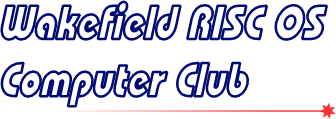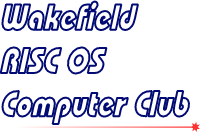Meeting: An Evening of Free and Retro Software
Peter Richmond took us through a collection of free software which he uses regularly on his RISC OS systems, with an emphasis on older titles that still work well on modern systems like the Beagleboard and Raspberry Pi.
Report by Peter Richmond
The March talk was by Peter Richmond, and was looking at some free and retro software that would work on computers such as the A9home, Iyonix, Raspberry Pi and all the newer RISC OS computers.
Peter started by saying that in theory there is a lot of free and retro software available, but the real problem is finding it! Although there is some useful software in the PlingStore, you can find a lot more if you rummage about on the internet.
He looked at software available for the A9home and the Raspberry Pi, but was aware that some of these titles can also run on RiscPCs and an Iyonix – he hasn’t got an Iyonix, so if anyone else would like to try out some of the free titles, he said that’d be useful for us to keep a compatibility list at the Club, which could be made general knowledge for the members.
Sound and vision
Peter started first by looking at utilities he uses, and then was going on to look at the games. He mentioned that he liked sound, pictures and video, so was looking at those first.
One of the first things most people want is an MP3 player, and one that suits all formats is Digital CD which can also play internet radio. You really need something at least as fast as a StrongARM RiscPC to use this software, which is available from the PlingStore.
The other thing he wanted to do was play back audio samples, and software that covers all the bases is SampleEd from the Really Small Software Company – this is available for all recent versions of the OS.
For pictures, Peter used a number of programs: PrivateEye for viewing JPEG images, ArtWorks Viewer (have a guess), OpenVector for things that get a bit more complicated than Draw can handle, but without using ArtWorks. He also used Fade for simple presentations, as well as OHP Show for presentations that he’d made on other computers.
For video, there really is only one program, and that’s KinoAmp which plays MPEG1 or VCD quality videos. To prove the point, Peter played a clip that he’d got from a VCD, and a clip that he’d shot on his own camcorder and then converted to MPEG1 so that it could be handled by KinoAmp.
Simple software
Peter then reminded us that all versions of RISC OS have BASIC built in. For anything written in BASIC, the only real complication is in defining screen modes (for things not running on the desktop) and dealing with sound (particularly sampled sound). [This does assume that the software was written ‘legally’: over the years, a lot of RISC OS developers have had a tendency to ignore the PRMs and do things in ways that seem to work but haven’t proved very ‘forward-compatible’ when new systems have come along. – Ed]
This means that many simpler programs can run on newer machines. To demonstrate this he ran a Jan Vibe moving graphics program which came from the back pages of Acorn User magazine: it drew random squiggles on the screen, which then resized and continued. Another such program was an educational one: SLoEurope, which is short for Spotlight on Europe – this draws a map of Europe on the screen then asks questions on screen about rivers, mountain ranges, capital cities etc, with multiple choices available, all timed against the clock. I think the version he’d got was an older one, but he believed that there is a version for the Pi which has more up to date maps.
Office tools
Peter then mentioned that he deals with a number of PC-format files, so being able to view these is really useful and there are a number of programs that fill the bill. ViewXLS is useful for viewing (but not modifying) Excel spreadsheets in the older .XLS format. Peter said that he had used Writer for reading RTF files: this was the version that was free with the RiscStation 7500 – there may be others [the Iyonix came with Writer+ – Ed], but he thought that you’d need to use Aemulor to make them work. You can use RTFReader, which converts RTF files into plain text, ready for saving. To read Word files up to the 2003 version, he also used AntiWord – which just gives the text.
Since Pipedream has become available for free, he now uses that for simple spreadsheets. Peter had found an interesting side to using Pipedream, in that if you give it a Word ’97 to 2003 file it’ll have a stab at reading the text. It does cut off each line before the end, but you can just treat this as a bonus because you can check which file is which if you have a few Word files.
Another useful utility is something Peter got from an Archimedes World cover disc from 1995 and is called Convertor: it can convert from metric to imperial, or the other way around, and seems to work on all types of units [An alternative, which is probably more easily available and should work on all modern hardware, is Chris Johnson’s UnitConv – Ed]. Another program that he kept running all the time is SmallTime, which hangs around the iconbar and gives you the day, date and time in a compact format.
To show all these programs more easily on the projection screen, Peter was using a PD utility from ages ago called Microscope, which offers a scaleable viewing window (as opposed to the standard fixed window that is available in other programs).
Light entertainment
So, on to the games. Peter said that he’s not a person who likes to think too much when he’s playing a game – but the exception to this would be X-Word, by Alan Trewartha, which he described as Not Scrabble! You can play against the computer at various levels, and it seems to give quite a good game.
A game that seems to have been converted for use by all versions of RISC OS is Chuckie Egg, an 8-bit platform game that Peter still couldn’t easily get past level 4, even after all these years! It definitely has the addictive quality.
There are now a number of games that have come from the Linux world, and play quite well, but need at least an Iyonix or A9home to be able to play them – strangely enough, a Raspberry Pi is easily up to the job! One of his favourites was LBreakout 2, which is a fairly whizzy variation on the basic Breakout and has various bonuses such as extra balls, bigger bats etc. There are others such as Hexahop, PipeNight and PenguinCommand, which mimic their arcade counterparts. Another more modern game is the platform game X-Rick, which features Rick Dangerous and also works on the Pi.
Playing with the Pi
So what about games on the Pi?
As Peter mentioned, all the Linux-originated games should work on the Pi, but there are also a few older games that work on the Pi but don’t work on the A9home: these are Cybertron and Dare Devil Denis, two very simple 8-bit style games. One game that could be modified to run on the Pi (but not on the A9home) was BigBang: a 90’s platforming game which looked as though all the programmers had been taking something psychedelic! This was found to run if one of the lines in the !Run file was removed and the game re-saved.
Something Peter found on the PlingStore was a first person shooting game, which runs quite quickly on the Pi and looks quite good: its called Roti (Rise of the Triads) and looks a lot better than Doom – whether it actually plays any better, Peter suggested that we try it out!
Where can I find this software?
If it’s not in the PlingStore – www.plingstore.org.uk – the software mentioned is here:
AntiWord – www.winfield.demon.nl
ArtWorks Viewer – www.mw-software.com/software/awmodules/awrender.html
Chuckie Egg, Cybertron, Dare Devil Denis – homepages.paradise.net.nz/mjfoot/riscos.htm
KinoAmp – users.skynet.be/Andre.Timmermans/image/kinoamp/kinoamp.htm
LBreakout – www.reallysmall.co.uk/Pages/normal/software/games/games.html
LBreakout 2 and many other ported games – www.riscos.info/packages/SectionIndex.html
PrivateEye – www.davespace.co.uk/risc.os/privateeye.html
Spotlight on Europe – jonathan.rawle.org/software
ViewXLS – home.allgaeu.org/areiser/riscos/software/viewxls
XWord – alantrewartha.tripod.com/xword







